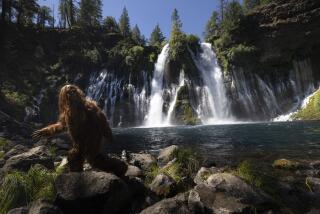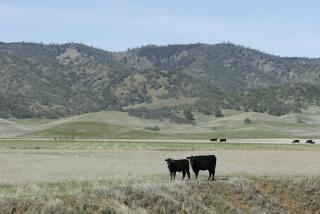On Hetch Hetchy, John Muir was wrong
- Share via
Hetch Hetchy Valley reached a high of 99 degrees when I visited recently. But even on a blistering day, the lesser-known great valley of Yosemite National Park was a beautiful place. Brilliant wildflowers, shady glens, Wapama Falls cascading 1,300 feet and casting a cooling mist over the wooden bridges — and me — below. Opposite the falls, imposing Kolana Rock was mirrored perfectly in the still, blue water of the reservoir.
That reservoir, which covers the valley’s bottom 300-plus feet, has been wildly controversial since well before it was built. John Muir, California’s revered naturalist, wrote a poetic diatribe against O’Shaughnessy Dam, erected in the 1920s to provide a water source for San Francisco. “Dam Hetch Hetchy!” Muir famously fumed of the place he called the twin of Yosemite Valley. “As well dam for water-tanks the people’s cathedrals and churches, for no holier temple has ever been consecrated by the heart of man.” Ever since, it seems, there has been talk of breaching the dam to restore the valley’s grandeur. The current attempt is a November ballot initiative in San Francisco that, among other things, directs the city to develop a plan (though not to carry it out) for draining and restoring Hetch Hetchy.
I’ve written editorials about such efforts in recent years, concluding that although the federal legislation allowing the dam was a disgrace, this isn’t the time to spend up to $10 billion to empty and restore the valley. But I had never seen Hetch Hetchy myself. This summer, the family vacation would be spent putting my feet where my pen was.
After visiting the two valleys on consecutive days, I feel the same way, only more so.
Yosemite Valley is studded with heart-stopping landmarks such as Half Dome and Bridalveil Fall, but its floor is equally famous for the crowds. Cars vie for empty spots along the road, and throngs of tourists march along paved paths to the chief attractions, where they almost invariably ignore signs to stay off the rocks. The parking lots are jammed; the concessions are located for convenient shopping, dining and lodging; and the campground is so crammed with shoulder-to-shoulder tents that it looks more like a ripstop ghetto than the site of a nature experience. Surely this isn’t what Muir had in mind either.
By contrast, Hetch Hetchy draws a handful of visitors to its waterfalls and glacier-carved granite cliffs. It’s not a convenient tourist spot. There are no hotels, no restaurants and no paved, fenced walking paths except along the top of the dam. The uses of Hetch Hetchy are gentle ones — hiking, backpacking to primitive campsites and fishing in the reservoir — and the land along its trails appears untrampled. During a five-hour outing, we came across 10 or 15 other humans; the chipmunks outpopulated the hikers.
Though O’Shaughnessy Dam was built to last, one day it will be too old and worn to do its job. Even its critics don’t suggest demolishing it; the task of trucking all that concrete out of the valley would be an environmental disaster of its own. Instead, it should be breached, to drain the valley and bring back the historic river flow; this land belongs to the nation’s people, not to San Francisco. But at the peril of being forever banned from the Sierra Club, my sense is that when that day comes, Hetch Hetchy will emerge as the more wild and well-conserved valley of the two.
—Karin Klein
More to Read
A cure for the common opinion
Get thought-provoking perspectives with our weekly newsletter.
You may occasionally receive promotional content from the Los Angeles Times.










